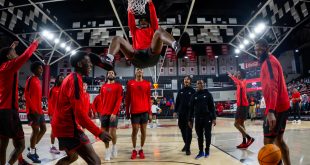Rarely does a record come along that is so careful in its construction that it feels like an album and not just a collection of songs. Kendrick Lamar’s major label debut, “good kid, m.A.A.d city,” uses all the tools that make a compelling hip-hop record which create an interesting and emotional narrative as it flows through its 12 tracks.
By mixing carefully selected moody beats with deep and thoughtful lyrics and skits that feature Lamar’s family and friends, “good kid” tells the story of a young Kendrick as he deals with the everyday troubles of living in Compton. This album does not pull any punches as it deals with heavy subject matter like addiction, gang violence and prostitution.
Because of this, many may not find this album as accessible as other commercial rap and hip-hop that is coming out these days, but with each and every listen the strength of “good kid” becomes more apparent. While some of the songs have that single potential (m.A.A.d city and Money Trees especially), this album works best as a collective work to be listened to from beginning to end.
Each song deals with its own unique subject matter, and Kendrick uses a variety of deliveries and creative lyrics to convey different emotions. In “Bitch Don’t Kill My Vibe,” Kendrick raps about staying true to himself and his own style while others in the rap game have a different motive. The chill beat and his delivery work perfectly to create this easy-going groove that fits the content of the lyrics.
One of the title tracks, “m.A.A.d city,” starts off with a banging beat and Kendrick rapping with a frantic tone about gang violence as he describes the mad city that is Compton. The song then transitions into a completely different beat that has a very early 90’s west coast feel.
I could go on and on about how each song works on different emotional levels, but I think it is better to just listen and make your own connections. I will say though that I have never had a song give me chills like “Sing About Me, I’m Dying of Thirst” Powerful stuff.
This brings me to another strong point of the album–the features. Each artist that was chosen to be featured on the album fits into their slot perfectly. Drake sings about love in “Poetic Justice,” MC Eiht lends nicely to the gangster vibe of “m.A.A.d city” and Jay Rock absolutely kills it with probably the best feature verse on “Money Trees.” The only thing I was disappointed with was Kendrick didn’t include the other two members of Black Hippy, Ab-Soul and ScHoolboy Q, on any of the tracks.
Overall, I have been incredibly impressed by this record and it has been on repeat since its release on Oct. 22. It has the potential to become one of the classics of this generation of hip-hop, and Kendrick is controlling his own destiny after two strong releases (if you haven’t checked out Section.80, get it ASAP). If you haven’t heard it yet, give it a try or two– or 20.
Rating: 5/5
 The Spectator The independent student newspaper of Valdosta State University
The Spectator The independent student newspaper of Valdosta State University




